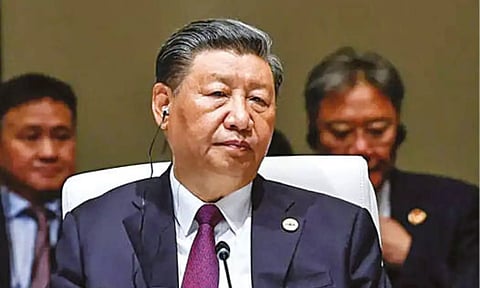

BEIJING: In Xi Jinping’s strategy for securing China’s rise, the Communist Party keeps a firm grip on the economy, steering it out of an old era dependent on real estate and smokestack industries to a new one driven by innovation and consumer spending.
But he may have to relinquish some of that control, as that strategy comes under pressure.
Consumers are gloomy. Private investment is sluggish. A big property firm is near collapse. Local governments face crippling debt. Youth unemployment has continued to rise.
The economic setbacks are eroding Xi’s image of imperious command, and emerging as perhaps the most sustained and thorny challenge to his agenda in over a decade in power.
“It’s a moment of great uncertainty, and arguably the moment of least confidence, surrounding the Xi administration,” Neil Thomas, a fellow at the Asia Society’s Center for China Analysis, said in an interview.
“The worse things get for China’s economy, the more likely it is that Xi Jinping has to make some course correction.”
Earlier this year, Xi started his third term as China’s president, appearing indomitable. He had cast aside three years of bruising pandemic lockdowns and was confident that business would recover.
He was committed to taming the debt-laden real estate sector even as home sales fell. And he had a new Communist Party leadership team of loyalists poised to push through his growth plans.
Xi’s government now confronts a tangle of difficult choices. On the one hand, he may have to give more freedom to private businesses and financial support to debt-saddled local governments.
On the other hand, he may have to apply more of his power to push through painful steps that some experts say are needed to fix the economy and state finances, such as introducing new taxes.
Central to the country’s economic troubles is the slump in housing sales, which is at least partly the outcome of Xi’s choices. The real estate sector has been a main driver in China’s growth for more than two decades, but developers have built up daunting levels of debt, and Xi has cracked down on excessive borrowing by them.
Now, as the real estate crisis ripples through the broader economy, officials have eased restrictions on home sales, and may take bigger steps.
In recent years, Xi sought to rein in private capital through regulatory crackdowns, drives against big tech firms accused of abusing consumers, and warning against “disorderly expansion of capital.”
Now, to spur growth, the government may have to open up new sectors for private entrepreneurs and investors, who have often been wary of Beijing’s promises of more support.
The property sector downturn is also straining the balance sheets of local governments, which have long relied on revenues from land sales. Some experts say that the central government may be forced to either give local governments more revenue sources or relieve them of some spending burdens.
“Xi Jinping likes control, but a lot of those changes mean giving up some control,” said Dave Rank, a former deputy chief of mission at the American Embassy in Beijing who is now a senior adviser at the Cohen Group.
And under Xi’s highly centralised leadership, he added, “the circle of people who’ll make the decisions about how to get out of this really, really challenging patch is very small.”
The party has been making the case that the country’s economic challenges are manageable, and that new drivers of growth, including electric vehicles and clean energy, are surging ahead. Indeed, not all observers believe China’s economy is in a sharp downward spiral.